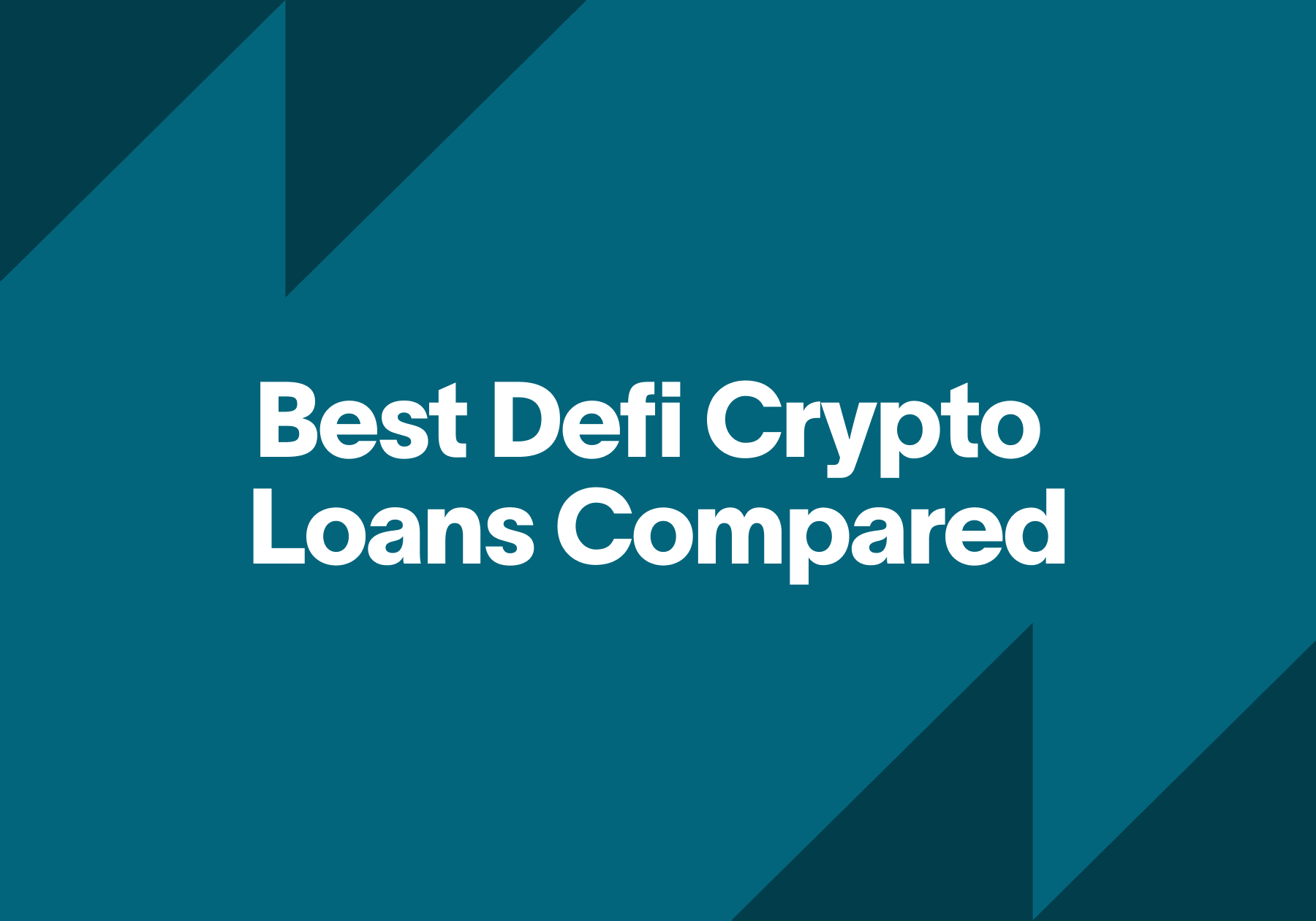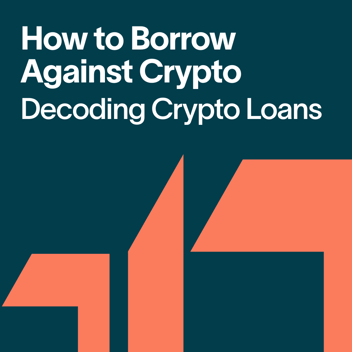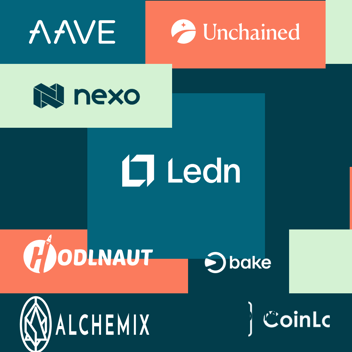The Five Best DeFi Crypto Loans in 2025

In this guide, you'll learn about DeFi lending, paired with a comprehensive comparison of the top DeFi crypto loan options. This should help set you on track to maximize your investments by giving you a range of knowledge and tools at your disposal.
What is a DeFi Crypto Loan?
A DeFi crypto loan is a loan obtained in a decentralized financial environment.
They allow borrowers to secure funds without needing a traditional financial intermediary.
By using blockchain technology, these loans ensure security, transparency, and accessibility, making it easier to borrow against cryptocurrency holdings.
Read more: Cefi vs DeFi - Key Differences Explained
How Do DeFi Crypto Loans Work?
DeFi crypto loans work by having borrowers lock up their digital assets as collateral in a smart contract. In exchange, they receive a loan in a stablecoin or another cryptocurrency. The process is entirely automated, governed by the online protocols and code, ensuring efficiency and security for both parties.
Read more: How to Borrow Against Crypto - Decoding Crypto Loans
The Five Best DeFi Crypto Loans 2025
Different platforms have strengths and drawbacks. The best choice depends on your investment size, risk tolerance, liquidity needs, and their unique quirks.
1. Aave
Aave is a pioneering DeFi lending protocol with a long legacy in the space. Over the years, it’s built a reputation for being innovative and boundary-pushing in the crypto sector, as it introduced flash loans (unsecured extremely short loans), and interest rate switching which alternates between stable and variable interest rates.
Over time, Aave has grown into an ecosystem of its own– not only does it have a core userbase, but it now has its own staking capabilities, and even its own stablecoin (GHO). It expanded its reach and cemented itself in the DeFi space.

Pros:
- Sophisticated tools for power users in the crypto space.
- Ethereum-based but interoperable with other chains.
- Flash loans available.
- Can switch your interest rates from stable to variable.
- Comes with its own stablecoin.
- AAVE tokens can be staked on the platform for additional income.
- Compatible with many crypto wallets.
Cons:
- Not beginner-friendly.
- Fluctuating rates can lead to unpredictability in earnings.
- No access to BTC
Read more: Aave vs Compound: DeFi Lending Comparison
2. Compound
Compound holds a significant place in the DeFi sector, as a trailblazing protocol that allowed users to tokenize their lending positions. For instance, if you deposited a certain asset (such as ETH or USDC) then you would receive a token in return that represented that, referred to as cTokens. Compound Finance has also been hailed as a catalyst for the 2020 DeFi Summer, where decentralized protocols skyrocketed in value and active users, which has helped to mark it out as a meaningful participant in the space.

Pros:
- Features its own token, COMP, adding an extra layer of potential earnings.
- Tokenizes your lending position, which you can sell or trade.
- Direct integration with physical crypto wallets.
- Earn compound interest.
Cons:
- While more beginner-friendly than some services, Compound still has a learning curve compared to CeFi alternatives.
- Limited to Ethereum-based assets, so no access to BTC.
3. Curve
Curve is typically known for its decentralized exchange, but in 2024 the service launched its own lending protocol, named LlamaLend. While it has its own name, it is very much within the Curve ecosystem, functioning similarly to typical trading tools. Where LlamaLend shines is in how it manages your loans.
The protocol algorithmically tries to improve or maintain your loan’s health by dynamically adjusting your collateral and debt positions through soft liquidations. This is where the protocol converts some of your collateral into your borrowed asset as a means of stabilizing your situation. It’s designed to be less abrasive than a hard liquidation, where your collateral is sold off entirely to repay your debt.

Pros:
- Gain higher APR by locking some of your CRV (Curve native tokens), referred to as boosting.
- Automatically enables soft liquidations to stabilize your position
- Access leverage for your loans.
- Stake from within the platform.
- Compatible with many crypto wallets.
Cons:
- Very high learning curve, designed for people who are deeply entrenched in the DeFi space.
- The highest APRs are reserved for people who lock CRV tokens.
- Limited assets available, with most of them being unpopular cryptoassets.
- No access to BTC
4. Liquity.org
Liquity.org is a DeFi platform that aims to offer its services to beginners. While simplicity can easily be found in the trading sector (with the advent of seemingly instant swaps), it can be hard to find a minimalist design for borrowing and lending. This is where Liquity comes into play. Its interface is stripped back and direct, making it more appealing to newcomers. Plus, it has high loan-to-value ratios, which are ideal if you want to borrow more (although that naturally comes with risks).
However, Liquity’s biggest limitation is that you can only borrow its own stablecoin, BOLD. While it is meant to be pegged to the US dollar, meaning on the surface it is not particularly different from USDC or USDT, the reality is that most people want to work with more well-known assets.

The potential benefit here is that Liquity lets you set your own interest rates, giving you granular control. Although, that comes with a catch: your interest rates affect your interactions with BOLD.
This stablecoins works less like an asset and more like a type of ticketing system. 1 BOLD does not exactly equal 1 USD, but rather it can be used to redeem 1 USD’s worth of other cryptocurrencies from the Liquity protocol. However, when the value of BOLD drops below 1 USD, it is propped up by the protocol reducing the amount of people that can actually redeem it. And those with the highest interest rates are the first to be disallowed a pegged redemption.
While this adds a new layer of complication architecturally speaking, its interface is still simpler than many other DeFi lending protocols.
Pros:
- Simple interface for beginners.
- You can set your own interest rates.
- High LTVs.
Cons:
- You must use the BOLD stablecoin.
- Setting a higher interest rate puts you at risk of a financially weakened loan in the future.
- Very limited assets.
- No access to BTC
5. Save.Finance (Formerly Solend)
While Ethereum-based DApps tend to get the most attention, as they have the largest community, Solana’s userbase has been growing for some time now, and as a result, it’s getting a greater range of services to support it. And Save.Finance makes up a part of that. This is a Solana-based DeFi protocol that offers borrowing and lending tools. It’s a simple service that lets you borrow a range of cryptocurrencies, after you deposit your funds for collateral.
You can even borrow and deposit ETH, as it has integration with the Wormhole bridge, which is a separate DeFi protocol that lets you bring a wrapped version of Ethereum over to Solana. Although, it’s worth warning that bridges tend to be targets for hackers, as interoperable tools are complicated to make, and the experimental nature of DeFi means that many developers are still learning as they build, leading to unforeseen vulnerabilities.

Pros:
- Borrow non-ETH-backed assets.
- Relatively simple interface with a minimal learning curve.
- Borrow established stablecoins like USDC and USDT.
Cons:
- Accessing assets that do not support Solana requires bridging, which can be risky as these services can be prone to hacks.
- No control over LTV.
- Algorithmically fixed APR.
The Best DeFi Crypto Loan Alternatives
If DeFi loans aren't for you, platforms like Ledn offer greater reliability, ease of use, and security.

Ledn is a centralized company, which allows it to offer a mix of crypto and fiat lending services. This dual offering provides users with a level of flexibility not commonly found in purely decentralized systems. The best example of this is that you can use BTC or ETH as collateral.
Read more: 15 Best Crypto Loan Platforms in 2024
Here's a closer look at what sets Ledn apart.
Human Representatives Rather than Protocols
While some people favor the mechanical nature of the DeFi space, where smart contracts and protocols control all activities, many individuals prefer to work with human representatives. One of the greatest benefits of Ledn is they can reach out to somebody for additional support and assistance. Plus, in the unlikely event that something goes awry, it’s comforting to know there is someone to speak to, which is in stark contrast to DeFi services where customer support is oftentimes nonexistent.
Supports BTC and ETH
Most DeFi lending protocols support ETH, but very few of them actually support BTC. This is because the Bitcoin blockchain is notoriously hard to make interoperable or to build on top of, and so integrating it into a DeFi service can be tough. Usually, the go-to workaround is to use a wrapped version of BTC, which is a cryptoasset that functions on other blockchains but represents its price. But these are merely representations rather than the real thing. Ledn, however, supports both BTC and ETH-backed loans. This is a huge positive, as it means you can work with the two most prestigious cryptocurrencies in the market.
Receive Fiat For Your Collateral
With Ledn, you can gain fiat in exchange for collateralizing your crypto. This is only possible with CeFi services, as DeFi is limited to digital assets. While these blockchain-based options tend to offer stablecoins as a way of bridging the gap, it is not the same, as there are extra steps to converting them to fiat, and some people may want to access funds quickly and without doing additional work.
Commitment to Transparency
One of Ledn's core commitments is to maintain a high level of transparency regarding its financial health and operational procedures. This approach is sought after among centralized lenders, as some are known to keep their internal workings under wraps. Ledn does this by publishing its Proof of Reserve data and Open Book Reports. This transparency helps build and maintain Ledn’s relationship and legacy; it’s a display of respect for its clients.
B2X Loans
A unique offering in Ledn's service portfolio is the B2X loan. It allows users to double down on their Bitcoin holdings in a straightforward manner. When you take out a B2X loan, you receive a Bitcoin-backed loan and an equivalent amount of BTC. This setup enables users to effectively leverage their current position while still accessing fiat. Once the loan is repaid, the user regains their original collateral as well as the additional Bitcoin, potentially increasing their market position.
The Different Types Of DeFi Crypto Loans Available in 2025
There are several types of DeFi loans to keep in mind. Let’s take a quick look at what’s available on the market.
Flash Loans
Flash loans allow you to borrow crypto without any collateral on the condition that the amount is returned within the same blockchain transaction. This is made possible via smart contracts that automatically execute the loan if the borrower meets all the specified conditions, including repayment, within a single transaction block. If the borrower fails to return the loan within that transaction, the entire operation is reversed as if it never happened. This feature is particularly useful for arbitrage, collateral swapping, and self-liquidation activities.
Read more: Crypto Loan Without Collateral: The Complete Guide
Undercollateralized Loans
Undercollateralized loans allow borrowers to secure a loan with collateral that is worth less than the amount they are borrowing. These types of loans generally rely on alternative mechanisms for risk mitigation, such as trust scores, social recovery, and other forms of creditworthiness evaluation.
Peer-to-Peer (P2P) Loans
Peer-to-peer loans connect borrowers directly with lenders, eliminating the need for traditional financial intermediaries. This can lead to more favorable terms for both lenders and borrowers, as it allows for a higher degree of personalization.
Read more: Crypto peer-to-peer lending: A beginner's guide
Overcollateralized Loans
With overcollateralized loans, borrowers must lock up a certain amount of cryptocurrency or crypto assets as collateral that exceeds the value of the loan they are taking out. This extra collateral acts as a security measure for the lender, significantly reducing their risk. If the borrower fails to repay the loan, the smart contract automatically liquidates the collateral to cover the loss.
What are the Benefits of DeFi Crypto Loans?
DeFi crypto loans offer a number of advantages, including:
Speed: Transactions are processed quickly thanks to smart contract automation.
Immutability and Transparency: Every transaction is recorded on the blockchain, ensuring transparency and security.
Accessibility: DeFi platforms are accessible to anyone with an internet connection, regardless of geography.
Collateral Flexibility: Borrowers can use a wide range of cryptocurrencies as collateral.
No Credit Checks: Loans are secured by collateral, removing the need for traditional credit assessments.
The Risks of DeFi Loans in 2025
DeFi lending isn't without its risks. This is a relatively novel area, with a short legacy, meaning that the market is still defining its standards, and experimentation from developers is common. While this leads to innovations, the flipside is that it can bring about some unsavory outcomes when things go awry.
What are the Risks of DeFi Crypto Loans?
Smart Contract Vulnerabilities: DeFi loans are dependent on smart contracts, which can contain bugs or vulnerabilities, exposing users to potential losses. While code does get audited for the most part, some errors are hard to spot due to how cutting-edge the DeFi space is.
Collateral Volatility: The value of collateral can rapidly fluctuate, leading to liquidation if it falls below the required threshold. This can be especially severe with altcoins.
Liquidation Risks: Sharp market downturns can trigger automatic liquidations, resulting in significant losses for borrowers.
Regulatory Uncertainty: The evolving regulatory landscape around the globe can introduce risks of compliance or legal challenges for DeFi platforms and their users. Many countries are still grappling with the nature of decentralized protocols and tools, and so it’s unclear how most governments will treat them in the future.
Operational Security: DeFi platforms may be targeted by hackers, putting user-funds at risk through breaches or theft.
Counterparty Risks in P2P Loans: Direct loans between users bypass traditional intermediaries, increasing the risk of default without recourse.
Platform Insolvency: The financial instability of a DeFi platform can lead to a loss of funds for users if it becomes insolvent.
Rug Pulls: Developers or insiders can abruptly withdraw support or funds from a project, essentially stealing from users.
Lack of Insurance: Unlike traditional financial institutions, DeFi platforms typically do not offer insurance on deposits, increasing risk if the platform fails.
How is DeFi Lending Different from Traditional Lending?
DeFi crypto lending platforms use blockchain technology to redefine how loans are processed, secured, and managed.
Read more: CeFi vs. DeFi: Key Differences Explained.
1. No Intermediaries
Traditional Lending: Involves centralized organizations acting as third parties who handle and look after funds. They are custodial in nature.
DeFi Lending: Utilizes smart contracts on blockchain networks to automate the lending process. This removes the need for third parties, reducing costs and streamlining operations. Loans are directly between borrowers and lenders, facilitated by the DeFi protocol.
2. Efficiency
Traditional Lending: Processing times can range from hours to days, depending on the service. That being said, while many traditional lenders can be slow in issuing loans, you can typically access fiat from Ledn within 24 hours.
DeFi Lending: Thanks to smart contract automation, transactions and loan disbursements can occur almost instantaneously. Smart contracts execute under predefined conditions, significantly speeding up the process.
3. Flexibility
Traditional Lending: Products and services are relatively standardized, with innovation occurring at a slower pace due to regulatory constraints and increased risk management. This is not exactly a negative, but rather a point highlighting that traditional lenders are more cautious with experimenting.
DeFi Lending: Continuously evolves, introducing innovative products like flash loans, yield farming, and algorithmic stablecoins. The DeFi ecosystem is characterized by rapid experimentation and deployment of new financial instruments.
4. Regulatory Landscape
Traditional Lending: Heavily regulated, ensuring consumer protection but also limiting operational flexibility and potentially stifling innovation.
DeFi Lending: Operates in a more obscure regulatory framework, which has fueled innovation but has also introduced risks related to compliance, consumer protection, and fraud.
Conclusion
By understanding the different types of DeFi loans, the benefits, and the associated risks, you can make informed decisions that align with your financial goals.
If you're looking for an alternative, Ledn shows how centralized platforms can innovate within the space, providing loan solutions with the efficiency and oversight of centralization, following an ethos of transparency and trust.
Sponsored by 21 Technologies Inc. and its affiliates (“Ledn”). All reviews and opinions expressed are based on my personal views. There are risks involved with buying, selling, or holding digital assets as explained in Ledn's Risk Disclosure Statement, which can be accessed here.




